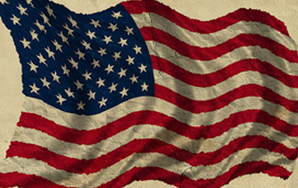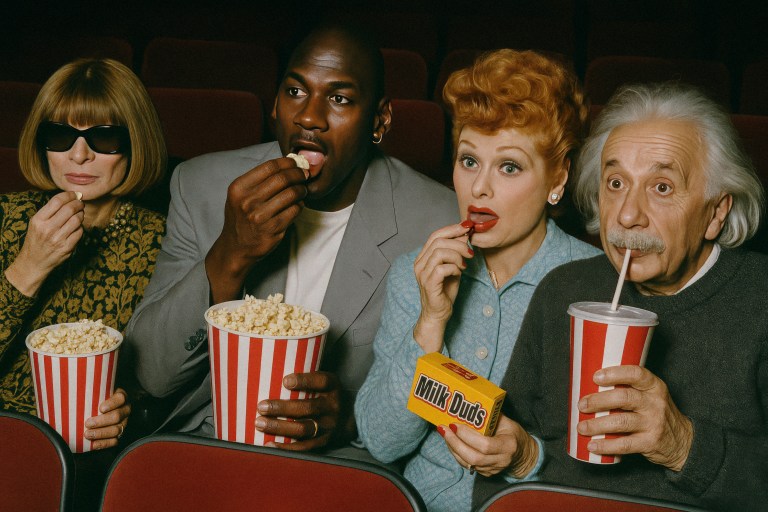
20 Things Most Americans Don’t Know About History
16. Evidence also indicates that we may have had our first bisexual or lesbian first lady.
By ![]() Nico Lang
Nico Lang
Did you ever read Lies My Teacher Told Me by James Loewen? If not, you should. It’s a book full of fascinating insights into the sides of history we’re never allowed to see, a warts-and-all look at the flaws that make history interesting. With Loewen in mind, I concocted a list of 20 things most Americans don’t know about history. (I imagine many people in general don’t know these things, as a 2008 poll showed that two-thirds of British teens thought King Arthur was real; another half thought Richard the Lionheart was fictional.) Some of these facts are Loewen-isms, others are well-documented elsewhere.
History is something that’s best shared with others, debated and endlessly discussed. What we think we understand today we often find out know nothing about tomorrow. That’s what gives history power. It’s alive.
1. Thanksgiving wasn’t originally intended to be a holiday celebrating multi-cultural togetherness, the ritual observance of overconsumption and James Bond marathons. The original proposal was to give thanks…to the Constitution. George Washington’s original proclamation in 1789 asked for a day of “prayer to be observed by acknowledging with grateful hearts the many signal favors of Almighty God especially by affording them an opportunity peaceably to establish a form of government for their safety and happiness.” To paraphrase a line from Gigli, “Gobble gobble, it’s government time.”
2. Dr. Martin Luther King Jr.’s real first and middle name weren’t Martin Luther. His first name, like his father’s, was Michael. The Michael Kings changed their chosen names after a trip to Nazi Germany, although both of them lived and died under the legal name of Michael King. Jr. almost wasn’t even a doctor. Years after his death, Boston University concluded that King plagiarized much of his doctoral dissertation but felt that “no thought should be given to the revocation of Dr. King’s doctoral degree” because of his passing. There was just no point anymore to taking the doctor title way. Besides, he did some pretty awesome stuff to balance it out.
3. When Rosa Parks refused to give up her seat on the bus, it wasn’t her first altercation with that bus driver. Parks had been ejected by the same driver 12 years earlier for refusing to board in the back of the bus after she had already paid up front. Meaning that Parks was a career badass.
4. Although Jamestown is often credited as the first British colony, it was only the first as far as the British were concerned. The Spanish beat them by a cool half century, setting up St. Augustine in Florida in 1565. Reports are that neither camp even counted as the first overseas vistors to settle in North America. It’s well-known that the Vikings settled in Newfoundland (hence the name) around the year 1001 CE, but less so that Africans had been making boat trips to the “New World” prior to Columbus’ voyage. Native Americans also landed in the Netherlands (then Holland) around 60 BCE., beating the Vikings by a millenium. Eat that, Scandinavia.
4.5. Side fact: Vikings never wore horned helmets. That idea like came out of the myth-making of the 16th and 17th century Europeans, who viewed the vikings as warrior crusaders with wings and horns on their heads.
5. We think of dirty politicking as a relatively new trend, but our negative campaign ads can’t beat the ones of the past. An attack ad on FDR claimed, “If he became convinced tomorrow that coming out for cannibalism would get him the votes he so sorely needs, he would begin fattening a missionary in the White backyard come Wednesday.” When fighting Lincoln, opponents went after his looks: “We know Old Abe does not look very handsome, but if all the ugly men in the US vote for him, he will surely be elected.” But my favorite, ever, was written about Grover Cleveland. It goes, “We do not believe the American people will knowingly elect to the Presidency a coarse debauchee who would bring his harlots with him to Washington.” Fucking harlots, man.
6. Woodrow Wilson was a huge fan of the movie Birth of a Nation, as he went to school with Thomas Dixon, who wrote the play the movie is based on. When the notoriously racist film debuted, Wilson is reported to have said, “It is like writing history with lightning. And my only regret is that it is all so terribly true.” Although many defenders of Wilson’s racist tendencies have tried to say the quote was misattributed and Dixon made up the quote to endorse the film, Wilson held a private screening of it at the White House, making it the first film ever shown there. Scholars claim that Wilson himself loved “darky” jokes and felt that segregation was a “rational, scientific policy,” placing many noted segregationists in his cabinet.
7. We all know that old-school Coca-Cola put cocaine in their drinks, but did you know Bayer coined “heroin” as a thing and produced opium products, encouraging you to use these “medical breakthroughs” on children? They also invented mustard gas. It was a simpler time. You might wonder then, with the backing of corporate America behind drugs, what got us anti-drug legislation. Racism. In 1878, San Francisco saw the first anti-drug laws pass as a way to stop people from frequenting opium dens. City officials claimed, “Many women and young girls, as well as young men of respectable family, were being induced to visit the Chinese opium-smoking dens, where they were ruined morally and otherwise.” If you’ve seen Reefer Madness, this logic will make much more sense to you contextually.
8. Although her claim to fame was as the subject of The Miracle Worker, Helen Keller had a second career: as a socialist activist and organizer. Keller advocated for rights of the differently abled, women’s suffrage and birth control and was a noted pacifist. The radical thinker was also an opponent of Woodrow Wilson (who was against universal suffrage) and supported Socialist candidate Eugene V. Debs in his presidential runs. Because of her impairments, the media universally discredited her organizing work. A Brooklyn publication wrote that Keller’s socialist “mistakes sprung out of the manifest limitations of her development.”
9. Napoleon is a short man’s idol, a sign that perseverance can overcome even a little obstacle like being a wee man. However, Napoleon wasn’t short — at least by the standards of his day. M. Bonaparte stood 1.58 meters tall (or a little over five feet), well within the average of the compatriots of his era. Instead of suffering from a lack of height, Napoleon reportedly was stricken with far worse: hemorrhoids. Some scholars even suggest that a terrible flair up of butt pain cost Napoleon the Battle of Waterloo.
10. We’re all pretty aware that Disney and elementary school lied to us about that whole Pocahontas thing, but how much? Well, she was twelve when Smith and his compatriots first embarked on their whirlwind New World adventure. Meaning there was no tasteful, PG romance with John Smith (aka cartoon Mel Gibson), she probably didn’t paint any of the colors of his wind and she didn’t save his life. She did, however, run away to Europe with John Rolfe, but the romance there was also dubious. The devout Rolfe reportedly fretted over “marrying a heathen” and their marriage was as much about sustaining peace in the colony as it was his affection for her. Pocahontas’ thoughts on the arrangement are unknown; although she was often treated with respect and admiration in London, she was just as often a curiosity and an object of derision. Many referred to her as “The Virginian Woman.” She died in 1617 while attempting to come back to the New World with Rolfe.
11. Edison was a brilliant man who help invent many things (like the phonograph, the mimeograph, the carbon microphone and moving pictures) but the light bulb is technically not his to claim. Edison developed the technology concurrently with Joseph Swan, a Briton who worked independently of Edison, although each knew the other was developing the technology. Although Edison is credited with inventing it, Swan holds the authorship for the bulb.
12. When you’re a kid who isn’t doing well in school (particularly math) Einstein is often held up as an example. “Einstein was a terrible student,” your parents remind you, “and look at everything he achieved!” Unfortunately, that’s not true. Einstein was a highly gifted and accomplished student. We misinterpret Einstein receiving 4s in school as a sign of poor performance (akin to a “D”) but those were actually high marks of the era. Einstein not only aced math but his parents bought advanced textbooks for him, as he often kvetched that formal education was “holding him back.”
13. It’s widely believed that Vincent Van Gogh cut off his ear to win the heart of a woman, but that’s not the case. A later story posited that Van Gogh lobbed it off after a particularly nasty fight with his friend, the painter Gauguin, and then handed it off to a prostitute in a brothel before returning home that evening to catch some shut eye. Normal day for Van Gogh. But a recent theory claims a different (and more plausible) reason that he wasn’t a righty talker: Gauguin, a skilled swordfighter, likely cut it off in a duel. I like this better, only because it makes him seem less crazy. The man shot himself in the chest and slowly died, penniless and believing himself to be forgotten. He’s been through enough.
14. We are told that witches were “burned at the stake” during the Salem Witch Trials — because “burning witches” has a nice ring to it, eh? It also makes me a little hungry for carnitas. But anyway, nobody actually got burned. During the notorious witch hunt, nineteen accused practicioners of the dark arts were hung and one defendant was crushed to death with stones.
Poll: Burned or crushed to death, which is worse? Discuss in the comments.
15. Many people believe that Abraham Lincoln might have been our first gay president — because of those much ballyhooed pillow talks with Joshua Speed, who Lincoln shared a bed with for many years. But unfortunately, such was a common practice of the era and doesn’t necessarily prove hanky-panky. However, we did have a queen in the White House elsewhere: one Ms. James Buchanan, our only Bachelor president. Buchanan’s sexuality was much whispered about on the hill, as was his closeness with William Rufus King. Andrew Jackson gave the two of them the nickname of “Miss Nancy and Aunt Fancy” and others called King “Mrs. James Buchanan.” A common euphemism for their relationship was to label them “Siamese Twins,” the sotto voce name for same-gender couples of the era.
16. Evidence also indicates that we may have had our first bisexual or lesbian first lady. FDR was a well-documented philanderer (even Hyde Park on Hudson, the recent biopic on him, isn’t shy about it) and his marriage to Eleanor Roosevelt may have been a marriage of convenience. Mrs. Roosevelt’s letters to her longtime best friend, Lorena Hickok, indicate a relationship that went beyond traditional female bonding. Their correspondences were shockingly intimate; Roosevelt often wrote lines like, “Never are you out of my heart” and “I wish I could lie down beside you tonight & take you in my arms.” Hickok and Roosevelt’s family burned the letters after Eleanor’s death, but Mrs. Roosevelt’s close friend Gore Vidal (himself bisexual) long affirmed the letters’ truth until his death last year.
17. The Civil War was a little more complicated than you were taught. Although we’re told the North and South fought over the issue of slavery, the reasons are also far more mundane. The rebel South was seen as an insurrectionary state and a potential competing power that needed to be stopped. In truth, many Northerners fighting didn’t give a damn about slavery and the Southerners enlisted were too poor to actually afford slaves. The Emancipation Proclamation was, in part, a way to convince any blacks who might be fighting for the South to join the other team. Lincoln himself once commented, “If I could save the Union without freeing any slave I would do it, and if I could save it by freeing all the slaves I would do it; and if I could save it by freeing some and leaving others alone I would also do that.” By “freeing” the slaves, Lincoln hoped to cut off the South’s resources and preserve the union.
18. Also, World War II is tricky, from a moral standpoint. We like to believe that in 1940s, Americans were these armed crusaders fighting for the rights of all, but the Depression also led to a rise of anti-Semitism in the U.S., just like in Europe. Disney cartoons from the era are fraught with anti-Semitic caricatures, and right-wing leaders accused FDR of allowing his administration to be run by Jews. Henry Ford even printed the “Protocols of the Elders of Zion,” a notorious anti-Semitic screed detailing a Jewish plan for world domination, in his corporate newsletter. Polls in 1938 showed that around 60% of Americans at the time deemed Jews “greedy and dishonest,” and by 1945 (aka the end of the war), Americans believed Jews had “too much power” in the United States.
19. There’s more. Believe it or not, the revered Rockerfeller Foundation funded many of the German programs for eugenics, like the one that employed Josef Mengele before he found himself at Auschwitz. Many in the United States supported the forced sterilization of the differently abled, mentally ill and criminals and anyone they deemed sterilizable. These folks included being “depressed,” “deviant” or “sexually wayward,” which often included homosexuals. (Remember: Homosexuality was classified as a disease until 1973.) Indiana passed the first forced Sterilization Bill in 1907 — followed closely by California, then the forced sterilization capital of America. The Oregon Board of Social Protection (originally the “Oregon Board of Eugenics”) performed the last ever forced sterilization in the U.S. In 1981. That was a scant 30 years ago.
20. The Korean War (also called the “Forgotten War”) never actually ended. The U.S. and North Korea agreed to a cease-fire on July 27, 1953 until the two sides could reach a “final peaceful settlement.” This settlement never happened and an actual peace treaty never signed. As you can surmise, we’re fighting many of the same battles today. ![]()











